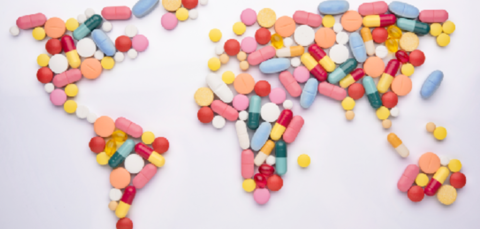MSIF puts a spotlight on the ethical use of off-label disease modifying therapies for MS
New publication from MSIF on ethical use of off-label DMTs receives global endorsement
Last updated: 26th August 2021
MSIF’s recent Atlas of MS survey showed that 72% of countries have major barriers in accessing DMTs and these barriers are even more pronounced in low and middle-income countries. 70% of low-income countries and 60% of countries in the World Health Organisation (WHO) African region report no licensed MS DMTs available for use. High-efficacy monoclonal antibodies – such as natalizumab, alemtuzumab or ocrelizumab – are particularly poorly available.
‘Off-label’ treatments are those that have been approved for other conditions, but not specifically MS. Off-label DMTs are often more readily available and affordable in health systems, and may provide a treatment option where other DMTs are unavailable or unaffordable. The Atlas of MS showed that off-label use is common – they were used in at least 89 countries. The evidence-base for off-label treatments is different to treatments which have regulatory approval, but they may be the only option in low-resource settings. The question of whether to use off-label treatments is a real issue that health systems, clinicians and people affected by MS face, and we want to support people to understand the benefits and risks, so they can make the best decisions to manage MS.
In this recently published paper, we put forward general principles for the ethical use of off-label DMTs for treating MS, and a process to assess existing evidence and develop recommendations for their use. The principles are outlined below and you can find the detailed process in the full MS Journal article.
Principles and long-term changes
General principles for the ethical use of off-label DMTs for treating MS and long-term changes needed:
- Off-label use of DMTs to treat MS should be driven by the need to protect the person’s health.
- Off-label use should be evidence-driven and considered when on-label DMTs are not tolerated, unsuitable for the best clinical outcome, unavailable or unaffordable.
- Shared decision-making between people with MS and their healthcare professional is especially important when off-label DMTs are considered.
- Appropriate information on health benefits and risks of the off-label DMT should be made available to people with MS by their healthcare professional during the full disease management pathway.
- Outcomes, effectiveness and adverse events when using off-label DMTs to treat MS should be carefully monitored.
Long-term changes needed:
- To support evidence-driven clinical decision-making and reimbursement decisions, guidelines for the use of off-label DMTs to treat MS are needed.
- The regulation of off-label prescribing for MS should be further considered and developed both nationally and internationally to support best clinical practice.
- Regulatory agencies and other organisations should develop measures to facilitate official registration of off-label use of medicines with a positive benefit–harm balance based on adequate evidence.
Endorsements from the global community
The principles and process are endorsed by the World Federation of Neurology (WFN), American Academy of Neurology (AAN), European Academy of Neurology (EAN), Americas Committee for Treatment and Research in Multiple Sclerosis (ACTRIMS), European Committee for Treatment and Research in Multiple Sclerosis (ECTRIMS), Middle-East North Africa Committee for Treatment and Research in Multiple Sclerosis (MENACTRIMS) and Pan-Asian Committee for Treatment and Research in Multiple Sclerosis (PACTRIMS).
